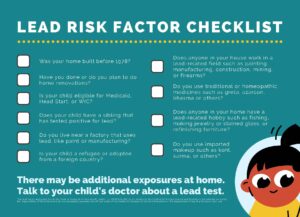Lead Safe Web Resources Include:
Lead Poisoning Prevention
Lead Testing
Lead Safety at Home
HEPA Vacuum Loaner Program
Financial Incentives and Resources
Lead FAQs
Lead Related Resources
Childhood lead poisoning is the most common environmental disease of young children. Lead poisoning can cause a series of health problems in young children including learning disabilities, hyperactive behavioral problems, coma, convulsions and even death. The concerning aspect of lead poisoning is that children will display no signs or symptoms of lead poisoning; only a blood test can confirm lead poisoning. Visit our Lead Testing page for more information. 
Lead sources are often found in homes built prior to 1978 due to the widespread usage of lead based paint during that time. Children who live in or spend 6 hours or more a week in homes built prior to 1978 are at high risk of lead poisoning, along with children who have siblings that have had lead poisoning. Dust containing lead particles is the primary source of childhood lead poisoning, but lead can be found throughout a child’s environment:
- Homes built before 1978 (when lead based paints were banned) probably contain lead based paint. When the paint peels and cracks, it makes lead dust. Children can be exposed to lead when they swallow or breathe in lead dust.
- Certain water pipes may contain lead. To reduce any possible exposure, run cold water through the tap for 30-60 seconds before use, as stagnant water is more likely to carry lead particles. Lead cannot be boiled out of water. Click here to access information on Springfield City’s water supply.
- Lead can be found in some products such as toys and jewelry.
- Lead is sometimes in candies or traditional home remedies.
- Certain jobs and hobbies involve working with lead based products. Jobs working at a gun range, serving as a police officer or soldier
 and some manufacturing jobs, like battery production, may cause parents to bring lead into the home.
and some manufacturing jobs, like battery production, may cause parents to bring lead into the home. - Children who live near airports may be exposed to lead in air and soil from aviation gas.
Interventions for Lead Poisoned Children
Lead-poisoned children under the age of 3 years old may qualify for Help Me Grow (HMG) early intervention services, a FREE statewide system that provides coordinated early intervention services to parents of eligible children under the age of three with developmental delays or disabilities. For local information, click here, or call (937) 322-2099.
To request your child’s free Developmental Disabilities of Clark County early intervention evaluation complete and submit this online referral form.
The Importance of Nutrition You can fight lead poisoning with a healthy diet. The Environmental Protection Agency’s (EPA’s) Fight Lead Poisoning with a Healthy Diet details action steps to protect against lead hazards, and meal and snack ideas that provide particularly important nutrients: calcium, iron, and Vitamin C. A healthy diet is important because when lead is consumed it is absorbed by the brain, liver, kidneys, and bones. A healthy, low-fat diet, rich in iron, Vitamin C and calcium reduces the body’s ability to absorb lead, helping to keep lead from entering the body’s bones, organs, and blood. Eating regularly, six small meals a day, is also important as empty stomachs absorb lead more easily.
Special Supplemental Nutrition Program for Women, Infants and Children (WIC) is a federally funded, income-based eligibility program serves to safeguard the health of low-income pregnant, postpartum, and breastfeeding women, infants, and children up to age 5 who are at nutritional risk. WIC provides nutritious foods to supplement diets, information on healthy eating including breastfeeding promotion and support, and referrals to health care. WIC food boxes provide many foods rich in iron, calcium, and Vitamin C – nutrients which reduce the body’s ability to absorb lead. Local WIC information is available here.
Behavioral and/or Learning Struggles at School lead poisoning is known to cause learning disabilities and behavioral problems. If your child is consistently struggling at school, they may qualify for special education services under the Individuals with Disabilities Education Improvement Act (IDEA). Parents can request the child’s school district evaluate the child for special education eligibility by sending a written request to the school district office. The school must send you a notice, either agreeing or disagreeing to perform the initial evaluation, within 30 days of receiving your request. If the school agrees to perform an initial evaluation, it must complete the evaluation within 60 days of receiving parental consent. Click here for more on getting your child evaluated for Special Education Services. A sample letter requesting an initial evaluation is available here.
Educational Interventions and Support The Center for Disease Control and Prevention outlines actions parents and educators can take to ensure lead poisoned children receive timely and appropriate educational interventions in Educational Interventions for Children Affected by Lead. The publication highlights the importance of developing and implementing necessary educational supports for children affected for them to be successful.